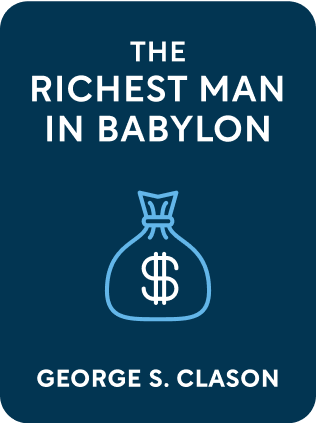

This article is an excerpt from the Shortform book guide to "The Richest Man in Babylon" by George S. Clason. Shortform has the world's best summaries and analyses of books you should be reading.
Like this article? Sign up for a free trial here .
Are you looking for The Richest Man in Babylon quotes by George Clason? What are some of the most noteworthy passages worth revisiting?
The Richest Man in Babylon by George S. Clason is a financial advice classic written in the 1920s. It distills his advice on how to acquire wealth, which is delivered by a fictional character Arkad.
Here’s a selection of our top The Richest Man in Babylon quotes by George Samuel Clason.
The Richest Man in Babylon: Quotes and Passages
In his book The Richest Man in Babylon, George Clason presents timeless principles for managing your money in the form of “Seven Cures for a Lean Purse” (how to acquire wealth) and “Five Laws of Gold” (how to preserve and grow wealth). The principles are illustrated by parables set thousands of years ago in the wealthy city of Babylon, where the basic ideas of finance were born.
The following The Richest Man in Babylon quotes highlights some of his key lessons.
“A part of all I earn is mine to keep.’ Say it in the morning when you first arise. Say it at noon. Say it at night. Say it each hour of every day. Say it to yourself until the words stand out like letters of fire across the sky.”
“A part of all I earn is mine to keep”—this is the first of the Seven Cures of a Lean Purse (the financial principles recounted by the main character Arkad). Clason reinforces that only the money you consciously set aside is truly yours. You may think all of your earnings belong to you, but when you don’t save a portion, you give them to everyone but yourself. For instance, they go to your grocer, your landlord, your shoemaker, etc.
Although you’ll be tempted to spend your savings at times, remember that spending brings only temporary gratification, while saving builds long-term wealth and security. And the person who saves part of his earnings will find it easier to acquire more money.
“That what each of us calls our ‘necessary expenses’ will always grow to equal our incomes unless we protest to the contrary.”
In the second of the Seven Cures of a Lean Purse, Clason’s advice is to determine your necessities and create a budget to cover them, plus a few worthwhile things you enjoy, not exceeding the remaining nine-tenths of your income. Don’t confuse wants with needs. If a pack animal got to choose his burden for a long trip, he’d choose to carry grain, hay, and water—necessities—rather than gold and jewels.
Live within your means or, better yet, live below your means. Should your earnings increase, beware of lifestyle inflation, which is the tendency to increase your spending as your income increases. What you define as necessary will always expand to keep pace with your income unless you resist.
Remember that the purpose of a budget is to grow your wealth while ensuring that you have the necessities and a few things you enjoy—without exceeding nine-tenths of your income. A budget shows you the potential “leaks” in your wallet, so you can stop them by maintaining control of your spending.
“Better a little caution than a great regret.”
This quote is from the parable The Gold Lender of Babylon in which Clason teaches the importance of caution when it comes to financial help. In the parable, Rodan, a spear maker, found himself with this dilemma. The king had given him fifty gold pieces because he liked Rodan’s design for a new spear point for his guards. The payment was far more than Rodan expected to receive. Now his sister wanted him to loan money to her husband so he could open a store. Rodan had doubts about the husband’s business acumen.
Unsure of how to respond, he asked Mathon, a moneylender, for advice. Mathon replied with a parable about an ox and a donkey. The ox complained to the donkey about having to work hard all day plowing the fields, while the donkey had little to do unless the farmer needed a ride somewhere. The ox was tired and wanted to rest, so the donkey advised him to pretend to be sick the next day, so he wouldn’t have to work. The ox did this, so the farmer gave him a day off. But meanwhile, the farmer hitched the donkey to the plow and the donkey ended up doing the ox’s work.
The lesson is, if you decide to help someone, make sure you don’t end up taking their problem upon yourself. If you loan money to someone who can’t handle it, you might have to step in and do their work to save your investment.
Based on his experience as a moneylender, Mathon offered Rodan this additional advice about lending money:
- Determine whether the would-be borrower has collateral or the earning capacity to pay back the loan.
- Someone acting under strong emotion is a bad risk for a lender.
- Someone with a track record of good decisions and prompt repayment is a good risk.
- A person already in debt is a bad risk.
Mathon’s final piece of advice on lending was that it’s better to be cautious than to suffer regret later. Not willing to risk losing his money, Rodan ended up declining his sister’s request.
“I do recommend to all men, that they, by wise and well thought out methods, do provide against a lean purse in their mature years. For a lean purse to a man no longer able to earn or to a family without its head is a sore tragedy.”
Here Clason is referring to the sixth of the Seven Cures of a Lean Purse. He reinforces the importance of investing for the future for two reasons: 1) if you die prematurely, your family will be provided for and 2) when you’re no longer able to work, you’ll have an income. He discusses three ways to do this:
- Buying real estate and land that will increase in value and can be sold later, or make other investments.
- Making small regular deposits with a money lender (bank) over time so you keep getting more interest as it grows.
- Buying insurance.

———End of Preview———
Like what you just read? Read the rest of the world's best book summary and analysis of George S. Clason's "The Richest Man in Babylon" at Shortform .
Here's what you'll find in our full The Richest Man in Babylon summary :
- A compilation of financial advice pamphlets distributed by banks and insurance companies in the 1920s
- Timeless principles for managing your money
- An entertaining story written in the form of three parables





